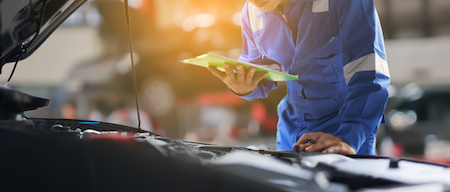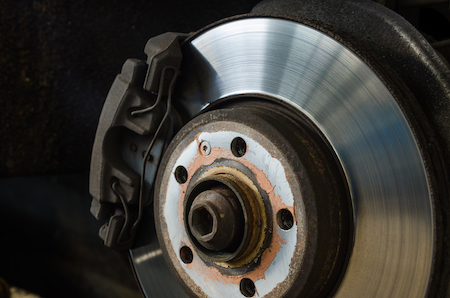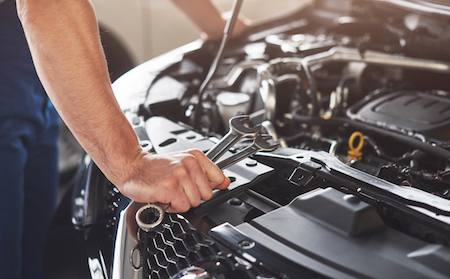We had a customer ask an interesting question the other day, and I thought it would be a great tip to share with you. She asked:
“My mom rarely drives her car. She may take it out a few times a year at most because she isn’t getting around easily anymore. It sits in the garage most of the time. Are there any special car maintenance items I should worry about? I would say she’s putting less than a thousand miles on the car per year. I want to make sure it runs well when she does get in it. ”
 A car sitting in a garage, barely used, sounds like the perfect way to preserve a vehicle. If it doesn’t hit the streets regularly, nothing wears out … right?
A car sitting in a garage, barely used, sounds like the perfect way to preserve a vehicle. If it doesn’t hit the streets regularly, nothing wears out … right?
Think again.
A car that just sits there unused still requires care. It has a lot of stress on it because it isn’t running regularly. Therefore it will have different problems than a car you use every day.
Ever heard the phrase “use it or lose it”? In some manner, that phrase applies to cars too. Cars are all about performance. They are designed to operate when you need them. But if fluids aren’t running through the system regularly, if parts just sit there adjusting to the elements without doing their jobs, wear still occurs.
If you have a car that is rarely used, the way you care for it while not driving it can effect the way it performs. Prepare your vehicle to care for the exterior, the battery, and the engine, and it’ll be there for you whenever you decide to use it.
“Whichever Comes First” Car Maintenance Plan
You’ve probably seen those little stickers some car maintenance shops stick on windshields to remind you to get your oil changed. They remind you to schedule your next oil change on a specific date, or when you reach a certain mileage threshold, whichever comes first. That’s a good approach to car maintenance when your car doesn’t move very much.
A car that sits won’t put the mileage on, but things like oil and additives are still sitting, aging, even though the car never leaves the garage. And it’s good to replace all of that to ensure the parts stay lubricated the way they should.
When in doubt, always schedule a maintenance visit with your local mechanic based on the calendar, not on mileage.
Keep The Car Clean
If at all possible, clean the car before it sits for extended periods of time. This is especially true here in Colorado, where all kinds of things can settle in on the paint or undercarriage during seasonal driving patterns – think mag-chloride, salts, sap, etc. At a minimum, run it through the carwash whenever you get the chance. Better yet, give it a deep cleaning removing even the hard-to-remove dirt and debris, polishing, and waxing it to help protect it against the elements. Pay attention to the undercarriage too, as rust can set in if harmful chemicals settle in.
Keep The Gas Tank Full
If you know the car will be sitting in the garage for an extended time period, it’s better to sit with a full tank than one that’s partially empty. Gas has a shelf life of around six months. As gas is manufactured from crude oil, it’s mixed with a variety of refining products. That’s what makes gasoline perform in your vehicle, and keeps it as clean as possible for the environment.
It’s a careful balancing act to ensure gasoline is at its peak performance, while providing you with the necessary qualities to ensure your car will go. Over time, the qualities change. You even put in different gas depending on the time of year – winter gas is a different blend to ensure your car will go no matter what the temperature is outside.
If your car will sit in the garage, keeping the tank full will help prevent moisture from building up in the tank, which can degrade the quality of the gasoline. But keep in mind that whenever you can, it’s a good idea to run gas through the system to keep all parts operating at their best.
Top Off Fluids
Gas isn’t the only fluid that keeps your car running strong. Brake fluid, engine coolant, transmission fluid, antifreeze, even windshield washer fluid all have a purpose for your car.
While every make and model has different requirements, it’s good to have a mechanic perform a routine car maintenance check periodically to ensure all parts are at optimal performance. For example, brake pads might not wear if a car isn’t used much. But that won’t stop leaks from forming in the system, impacting the braking performance of the vehicle. Periodic checks will ensure the safety of the vehicle whenever someone sits behind the wheel.
Protect The Battery
A car battery will, on average, last around six years. Of course, that depends on how it’s treated throughout its life.
The purpose of a battery isn’t to keep the car running. Instead, it’s about providing the necessary power to get the car moving. But that doesn’t mean if you don’t use it, it won’t slowly drain. Other things can drain a battery – headlights left on, GPS or cell phones plugged in, interior lights left on. Even sitting there will eventually take its toll.
If you know the car will sit without running for an extended period of time, you might also disconnect the battery to prevent corrosion.
Other Concerns
If a car sits for too long in one location, you might have other things to deal with. A nice warm garage is often a place where mice or other critters take refuge. Check for chewed belts, hoses, or nests, which can be built just about anywhere.
Windshield wipers might also crack or break easier. Because the rubber sits, it can dry out faster than when it faces elements each day.
You should also test tire pressure periodically. Reflate them to the recommended levels; you can find that in the car manual, or check online for the make and model.
Schedule Car Maintenance Today
Not everyone drives in the same manner. While most of us drive our cars almost every day, others rarely get behind the wheel. And when a car sits idle for too long, things happen.
The best way to keep a vehicle running no matter how it’s used is to schedule car maintenance checkups every year. If you haven’t had your car serviced because of lack of mileage, schedule it today to ensure everything is running the way it should.

 Air quality affects all drivers no matter where we are. Many decades ago, people began to become more aware of how air pollution negatively affects our health. But have you ever thought about the air quality inside your vehicle?
Air quality affects all drivers no matter where we are. Many decades ago, people began to become more aware of how air pollution negatively affects our health. But have you ever thought about the air quality inside your vehicle?






